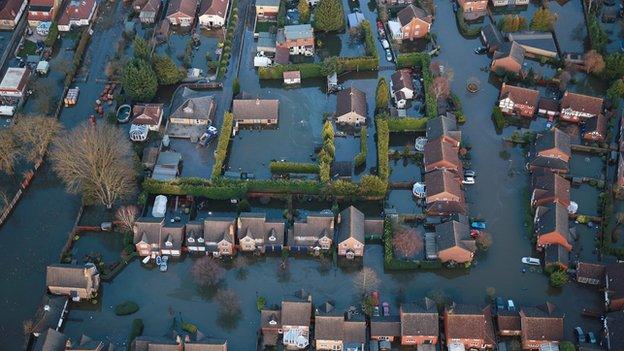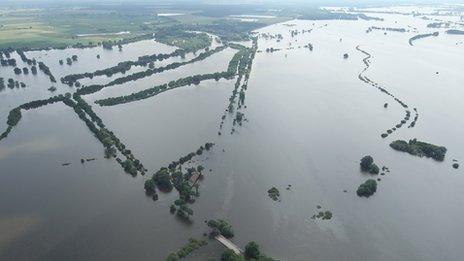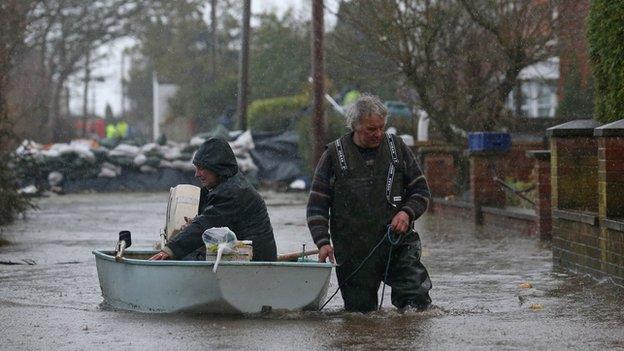Warming boosts UK flooding risk
- Published

January 2014 was the wettest since records began in 1767
A citizen science project suggests climate change really has increased the risk of flooding in the UK.
The issue has been highlighted by the recent floods, amid a January that saw double the normal monthly rainfall in parts of England.
Prof Myles Allen presented evidence of a link between floods and climate change at the European Geosciences Union (EGU) meeting in Vienna, external.
It indicates climate change is increasing the risk of extreme weather.
It also suggests that insurance costs are likely to grow.
UK Met Office data showed that the prolonged and heavy rain was an extreme outlier in the context of their records of 20th Century rainfall. But scientists can go back further to judge just how extreme this wet winter was.
It turns out that it was the wettest January and wettest winter in the world's longest daily rainfall record, collected in Oxford from 1767 to the present day.
At the time, many people suspected a link to climate change, but any such claim has been treated with caution.
Plenty of studies assessed in the most recent Intergovernmental Panel on Climate Change (IPCC) report suggest that extreme weather events should be expected in a warming world, but even there, the assessment was that the link could only be made modestly, with "medium" certainty.
In just two months following the flooding, perhaps spurred on by the local impacts on the Thames Valley, the team at the University of Oxford has carried out an "attribution experiment" to attempt to test what, if any, links can be made between the world's changing climate and local events like the UK winter floods.
Record winter rain
517.6mm
for the UK, wettest since 1910
435mm
for England and Wales,
wettest since 1766
-
It was 1.5° warmer than average across the UK
-
108mph strongest gust, recorded in Aberdaron, Wales on 12 Feb
-
12% more sunshine than average in southern England
Dr Nathalie Schaller and Dr Friederike Otto, together with others from Oxford's Environmental Change Institute, compared rainfall results from climate models based on the current global (warmed) climate with results predicted for the world we would be in today had fossil fuels never been burned.
They had to run 12,842 simulations using today's actual climate with 25,893 computer calculations of a non-warmed world to be able to get enough data to draw out the differences.
The data was analysed through a citizen science project that is still active, at climateprediction.net, external, the world's largest climate modelling experiment.
The results showed a small, but significant, difference between the two scenarios. They reveal that the probability of extremely wet English winters has increased with global warming.
Climate change means that the chance of extreme weather like the January 2014 floods has increased by a small, but measurable, amount.
The group's results imply that any weather fluctuation that would previously have been thought of as a "one in 100-year event" has now risen in probability to one in 80 years, due to climate change.

Speaking about the results at the EGU General Assembly, a gathering of 12,000 researchers here in Vienna, Prof Allen, from the University of Oxford, pointed out that this was the first quantitative study of the role of climate change on the 2014 floods.
Commenting on the results, Prof Thomas Stocker of the University of Bern, Switzerland (and Co-Chair of Working Group 1 of the IPCC), said: "The risk [of extreme weather] has increased. It has shown movement in one direction only - to greater risk."
Quoted in a press release, Dr Otto stated: "Past greenhouse gas emissions and other forms of pollution have 'loaded the weather dice', so the probability of the south of England experiencing extremely wet winters again has slightly increased.
"We are working with collaborators, such as at the Centre for Ecology and Hydrology, to explore the implications of our results for river flows, flooding, and ultimately property damage."
Insurance companies are very interested to understand how weather is changing compared with historic records, which is exactly the type of information that Prof Allen's team has obtained.
Dr Schaller notes that the results must be understood in context, and are specific to the UK in winter. "It all depends on the region and season considered. Climate change might increase, decrease or have no effect at all on flood events," she told the BBC.
"Hirabayashi and co-workers, for example, showed that floods are expected to decrease with climate change in Central Europe. So our results are only valid for the southern UK and for winter months."
Follow me on Twitter: @sim0nredfern, external

- Published3 March 2014

- Published16 February 2014

- Published16 February 2014
